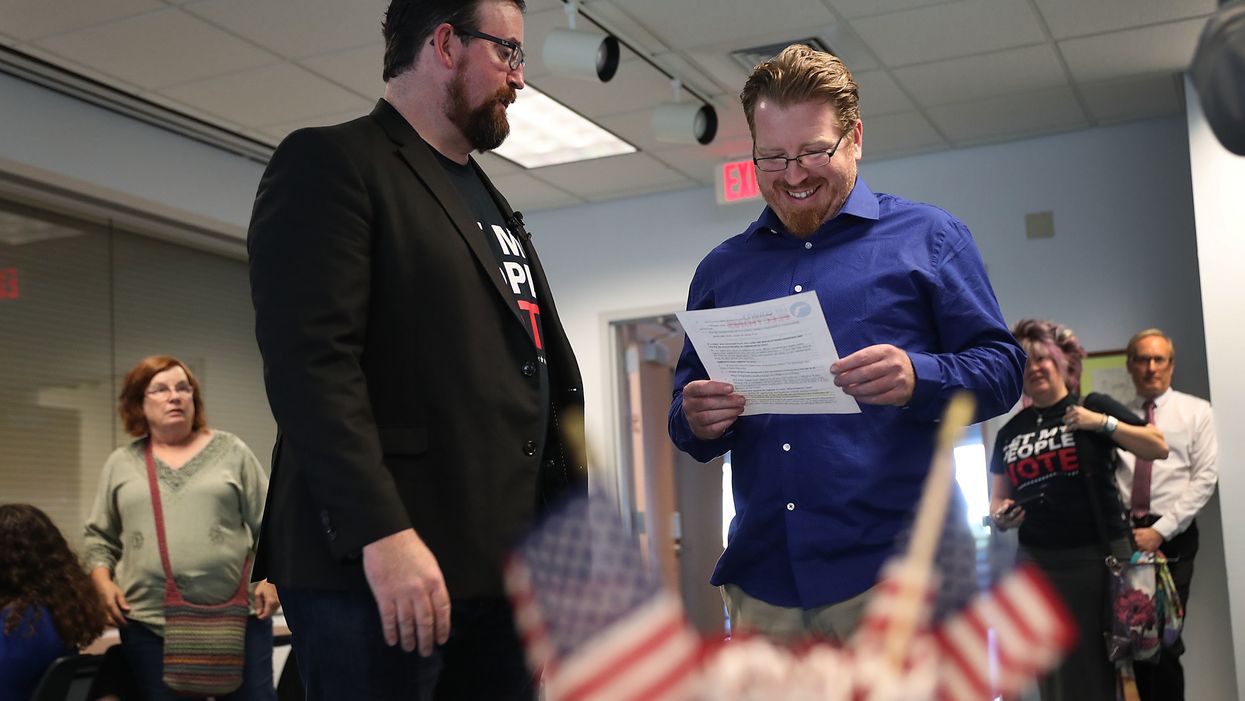Silvestre is on the communications staff of American Oversight, a progressive ethics watchdog group.
Despite a federal court ruling it is unconstitutional to bar people with prior felony convictions from voting if they cannot pay off their legal fees, most formerly incarcerated Floridians were excluded from this year's presidential primary.
After nearly two-thirds of Florida's voters approved a 2018 ballot measure to restore voting rights to 1.4 million formerly incarcerated citizens, the Republican-run Legislature wrote a law requiring them to first pay all their court-imposed fines, fees and restitution.
The resulting legal battle — between what the voters want and what the politicians in charge in Tallahassee want — may last beyond the presidential election, when the state's 29 votes are the third biggest Electoral College prize. All the while, what the state actually knows about which felons owe what remains a surprisingly big mystery.
In February, the 11th Circuit Court of Appeals ruled that 17 formerly incarcerated plaintiffs in a lawsuit challenging the law could not be denied their constitutional right to vote as punishment for being "genuinely unable to pay fees, fines, and restitution on account of their indigency."
Since the ruling only applied to the plaintiffs, the case goes on. GOP Gov. Ron DeSantis, who insisted on conducting the March 17 primary despite the coronavirus pandemic, plans to appeal to the Supreme Court.
Meantime, Florida's inability to confirm whether and what those would-be voters might owe remains a serious concern.
Our investigation has revealed state agencies are not prepared to track the individual statuses of everyone who could be re-enfranchised. And despite the Florida Department of State's previous assurances that it is developing a centralized database, documents we obtained show that human errors like misspelled names and typos continue to pose a challenge — as have the sometimes confusing directives from the state.
One interagency agreement between the Department of Corrections and the Department of State — signed in 2016 and made available by our public records request — says "documents relating to misdemeanor offenders, offenders under supervision, and offenders sentenced prior to 1998 should be obtained from the appropriate clerks of court."
In January 2019, however, Leon County officials were instructed otherwise. A draft notice shared with employees by the county's criminal courts chief advised that to learn about costs and fines assessed before 1998, "one will need to contact the Florida Department of Corrections for any balances owed, including any court ordered restitution."
These conflicting directions circulating through different agencies seem confusing from the outside.
Last June, with the law's passage imminent, election officials in Leon County (centered on Tallahassee) asked the Division of Elections "how the state is going to move forward in regards to providing updated voter registration applications" that comply with the impending statute.
The guidance from the state agency — which instructed clerks on how to determine if a person is still incarcerated or under state supervision for a felony conviction — seems to have left Leon County with more questions than answers. A week later, the county supervisor of elections, Mark Earley, emailed the state office: "I just wanted to give you a heads up that ... without more specific details, it is very difficult to say with any clarity what the status of these individuals in relation to felony conviction actually is."
Leon County officials were not alone in their confusion. To prepare for the new law, court clerks statewide were running tests of 10 sample cases to compare their records with what the Department of Corrections had on file. They quickly found an array of problems — multiple felony convictions, files scanned and uploaded in bulk instead of individually, missing case numbers and misspelled names — making it difficult to track individual cases, let alone determine former prisoners' voting eligibility.
Clerks in Hillsborough County (Tampa) found, for example, that in four of five samples there were incomplete fee listings, old addresses or computer errors making a correct assessment impossible.
To manage the blossoming set of problems, the Legislature created a Restoration of Voting Rights Task Force and DeSantis began naming members last August. They were told to conduct a thorough review of the system and then propose fixes.
Records obtained about that investigation revealed, of the 38 counties that reviewed their records to see how easy it would be to implement the law, 28 of them reported name misspellings, contact information inconsistencies and missing figures that would complicate the process.
As the November election draws nearer, Florida's formerly incarcerated citizens will continue to face hurdles that prevent them from voting until a concrete resolution is reached through the courts. Until then, the best we can do is shed light on the obstacles these people will face even if their right to vote without first writing checks is upheld.



















